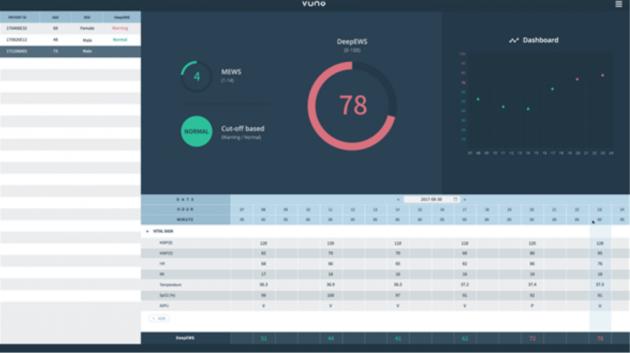VUNO has released new study results, which show its artificial intelligence (AI)-based cardiac arrest prediction software, VUNO Med-DEWS, is superior to existing models regarding accuracy and false alarm rate.
The clinical trial results titled “An Algorithm Based on Deep Learning for Predicting In‐Hospital Cardiac Arrest” were published in the Journal of American Heart Association Tuesday.
The Korean AI startup, in partnership with Sejong Hospital, has developed the VUNO Med-Deep Learning-based Early Warning System (DEWS), over the past two years. The system predicts whether a hospitalized patient will go into cardiac arrest within 24 hours.

A rapid response team in Sejong Hospital is using the system to predict the abnormal status of patients, VUNO said.
Hospitals often use risk assessment indexes such as Modified Early Warning Score (MEWS) that are based on vital signs to evaluate the status of hospitalized patients. However, these indicators often have low accuracy and a high false alarm rate, revealing limitations in the clinical field.
VUNO developed the deep learning-based model that automatically predicts the risk of cardiac arrest by using data of four vital signs, including blood pressure, heart rate, breathing rate, and body temperature.
Clinical trial results confirmed the model has statistically meaningful higher accuracy and a lower false alarm rate than other algorithms such as MEWS.
The accuracy of the deep learning system to predict cardiac arrest within 24 hours for hospitalized patients was 85 percent, according to the Area Under the curve of the Receiver Operating Characteristic (AUROC) score while the rate stood at 60.3 percent for MEWS.
The sensitivity for DEWS was also higher than MEWS by 24.3 percent. The false alarm rate was 41.6 percent lower.
Hospitals with 1,000 beds often face workforce limitations and cannot attend to all notifications that warn of potential cardiac arrest, if the number of notifications exceeds 40. The study found that, after setting the algorithm to a maximum of 40 warnings, the sensitivity predicting the onset of cardiac arrest for MEWS was 4 percent, while the rate for VUNO’s DEWS was 42.7 percent.
"The clinical trial results are meaningful in confirming that [DEWS] can let medical professionals the signs of danger ahead of time and help them execute an appropriate intervention on time. We expect DEWS to become AI that saves people's lives," VUNO CEO Lee Ye-ha said.
The company expects its new software will get a medical device approval from the Ministry of Food and Drug Safety in the second half of this year, Lee added.

